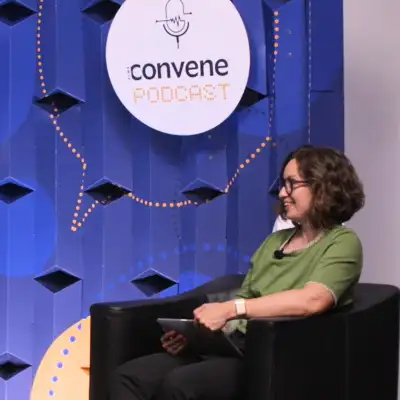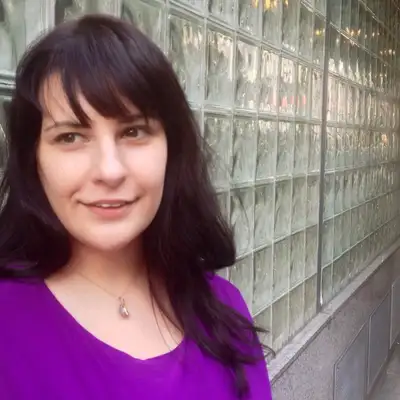Creators and Guests
What is PCMA Convene Podcast?
Since 1986, Convene has been delivering award-winning content that helps event professionals plan and execute innovative and successful events. Join the Convene editors as we dive into the latest topics of interest to — and some flying under the radar of — the business events community.
Convene Talk, ep. 83/October 17, 2025
*Note: the transcript is AI generated, excuse typos and inaccuracies
Magdalina Atanassova: This is the Convene podcast. Welcome to another Convene talk. Jen, go for it.
Jennifer N. Dienst: Thanks, Maggie.
So I thought it would be interesting to chat about an interesting article I saw written by SKIFT writer Barbara Scofidio, which was published, I think last week.
It was called both planners and supporters Suppliers agree there are too many industry events this pertinent because we have one of our industry's biggest shows kicking off this week in Vegas, IMEX.
But I thought it was, it was interesting topic.
I read through the article and I was kind of surprised to see that there was not necessarily, not, not necessarily everyone agreed on, on their answer. So some people thought, you know,
there's way too many industry events, it's exhausting, there's no way I could possibly attend all of these. While others,
particularly suppliers who I think are based in sales, said that they would actually like more.
So I'll break it down a little bit.
The article points out that there's about 52 global industry events annually.
And this is according to Skift's own calendar. And that doesn't necessarily include things like FAMs and invitation only customer events,
all the different ancillary events that we see happening in our industry.
So essentially that means that if planners wanted to, if they wanted to attend the major events, the major shows like IMEX and gotta plug our own Convening Leaders,
they could attend one a week on average, which is quite a lot.
So she pointed out that someone in the industry conducted an informal poll on their LinkedIn profile and found that 88%,
I think about 150 people responded.
They responded yes to if there are too many industry events that not only consume your time but your financial resources. So it seems to me like there's,
there's definitely a large number of people in the industry who feel like there's just a bit too many going on.
However, I thought it was interesting and some of these LinkedIn posts that were discussing this article and this topic, there were a lot of people who spoke up saying that,
you know, it really depended on,
you know, what their intent was, what their job is,
what their goals are. It seems like those are in sales. It's the more the merrier.
Some said that it's not necessarily the number of events, it's that a lot of events are lacking in what they want or lacking in intention or quality.
So maybe there's a quantity versus quality problem going on.
So another thing that Barbara pointed out in the article, which I thought was interesting, is some of the things that make a time strapped Planner say yes to an event.
Is quality education or like an opportunity to learn certification?
Also,
networking is another important feature that would make them say yes or go to an event,
choosing one over another.
Also,
you know, they didn't necessarily, some people didn't turn up their nose, you know, if it meant meeting with suppliers, if they knew that that destination was on their short list or consideration set for a future.
So I thought that was interesting too. It just really depends on what's being offered and whether or not they're going to get a lot out of it.
But I wanted to expand this question.
I thought that, you know,
we could talk about industry events, but from a strategy perspective for a planner or an organizer,
is less, more, is it more impactful,
do you think, to focus on fewer events or are there times when more is better? Say if sales were the goal versus education.
Maggie, I'd love to hear your opinion on that since you've, you know, worked in the industry for a long time. But Kate, I see your hand is up. What are you thinking about?
Kate Mulcrone: So I just wanted to go back real quick to what you were saying about the original LinkedIn poll that inspired this article and Skift.
So I looked at it and so first of all,
I think it's interesting that the person who posted this is Joe Fehol, who is the principal of Ethos Event Collective because, simply because he's a supplier.
And I was surprised by this sentiment coming from a, from a supplier. And this is exact. What he said was like kind of exactly. The question that you just framed for us this week has brought to light the challenges within our industry,
showcasing the struggle many of us face with conflicting events and commitments.
The demand for travel, learning opportunities, networking and conducting business has reached a boiling point.
The current scenario has left numerous suppliers, suppliers again, feeling overwhelmed and stretched thin.
So it seems like it's even the suppliers are saying this is too much of a good thing.
Then we have reached a stage where we have to start culling.
And then the second thing I would say is just that this only had 50 responses to the poll.
So it was like very easy to take the percentages. So there's only one person who said there aren't enough events,
five people who said it's just about right,
and then 44 people who said there are too many.
But again,
this data is coming from whoever's connected to this guy on LinkedIn.
So it's like a little bit anecdotal.
And so again,
like you,
I would love to hear what Maggie thinks from the planner perspective. About is this too many or just right?
Magdalina Atanassova: Yeah, I don't think the answer is clear cut.
So I don't think there is a yes or no. I do believe the answer lies in the model of industry events rather than if there are too many or too little.
Because currently we rely on the suppliers to pay the money, right. So especially when we're putting it in the context of IMAX and such,
so they have to invest heavily to be on the show floor.
And these monies support all the host buyers that go and you know, they meet.
And that's why in the article in Skip, somebody said, you know, you have to profile planners very carefully check on their piece of business.
Sometimes they inflate it 100%. True, all of it.
Some people just use the hosted buy opportunities to go on vacations and we know that it's, I believe it's happening lessons after Covid now because people are a bit more, more strategic.
But this whole model just prompts us in this kind of a wrong mindset I would say.
So neither is doing business well.
The expectations are such that when you have the suppliers invest in shows like Imax then they really, really want to meet with procurement.
And I'm thinking in the PCO model where you have a procurement department,
these people are actually sourcing the hotels, the venues, the destination. So they need to know everything in detail. These people though,
they're being pulled in all these different directions because they are the key to association business.
But then you have all these other departments that need the industry events. So you have the marketing, you have association management, you have all these bits and pieces that make up the other departments in a PCO model again who need to attend these industry events.
And then it becomes hard because how can you go as a marketing person to IMEX?
You have to fake to be a hosted buyer or rely on the kindness of IMEX and the like to host a big group from that said PCO so you can also attend so you can get the industry education, you can get the connections and everything else.
So I believe the problem is in the model rather than the how many events we have and how they're profiled. They really try to connect just two kinds of people and there's no space for the rest.
And that's why the model breaks rather if we were a bit more strategic. And now I like I'm thinking of CEMA and CEMA Summit and I'm very disappointed I didn't know about CEMA and CEMA Summit when I was in marketing because that's a brilliant event for marketing people.
But it's especially a few years ago it was so much more locked into the US and or North America and you know, locking in Europe.
So that would have been the perfect answer when I was in marketing, but I didn't know.
So satisfying the different needs of all those different roles in events would be perfect through different events. So then we would need more events to do that successfully.
So it's a bit like also then you have independent planners who try to do everything,
but their needs are also so unique that just one event, one big trade show probably won't satisfy it. So probably I just put more questions and answers out there. But I feel that,
yeah, we need to be rethinking the models and how we create these events.
What are the needs of the answer?
Jennifer N. Dienst: I think that's so interesting the way you frame that and, and it kind of points to that.
We actually do need more events. We just need more targeted niche events. It sounds like.
And it does seem like we're kind of heading in that direction industry wide. Do you think we're starting to see like more of that? I. I feel like anecdotally when I' looking at like calendars and starting to see that.
Which, which makes sense. I think we see that in like other areas of business too,
like mag. Like I feel like publishing and you know, our world of, of of journalism. I'm starting to see more niche publications come out.
But yeah, I think,
I think that's interesting. So maybe this kind of old,
these, these huge, massive events,
you know, maybe aren't, you know, they're great for those, like you said, who fit that kind of traditional model of buyer and supplier.
But we need these kind of more specialized targeted events to kind of satisfy where the. Everyone else is in between not getting what they need out of it.
So that's interesting.
Magdalina Atanassova: That makes me think also of that episode we did with the.
What was it,
that women only event for creatives.
Jen,
I think you brought it up again.
I'm blanking on the name.
Jennifer N. Dienst: I'm blank. I'm blanking on too. But I, I know it's like somewhere in my brain.
Magdalina Atanassova: I'll link it in the show notes. In any case,
the creative creative something.
Anyway, so that community and how it became an event,
I think that's why these events are so successful because they're so narrowly targeting specific people and that was for women who are in the creative economy.
So it was.
Jennifer N. Dienst: Oh, was that create and cultivate that we chatted about before? Yes, yes. Yeah. Yeah. Which is actually a quite a large event, but it is a little bit niche. Yeah, yeah, yeah, Yep.
Magdalina Atanassova: And that's why such events are so successful. Just because they're, you know, they know exactly who they are for and what they're bringing while in those.
When you create an event for everybody,
it's like,
it becomes hard. And now.
Jennifer N. Dienst: Yeah, it's kind of like branding and marketing. I see a lot of destination marketing doing the same thing,
and I wish destinations wouldn't do that because I think when you say the same five things over and over is, we've got great food, culture,
space, blah, blah, blah. You know what I mean? Like, you're not differentiating yourself.
And by speaking to everyone, you speak to no one. You can't be afraid.
Yeah. To be original, be unique.
Say,
say what's, you know, different about.
About your destination, about your show, whatever. Yeah.
But I think people are afraid to do that.
And it seems like from what a lot of people were saying, that was that were quoted in the article that were commenting on these posts, you know,
they're really looking for something specific. Like they need a good reason to take three days off work.
Like, it can't just be,
you know, oh, we'll get a bit of little networking. And like, they're like, she was saying, like, if I want to go and get a certification or, you know, like,
check off my CMP credit, whatever, you know,
that's giving someone good reason. But it seems like that's not.
That's like the exception to some of these events and not the role from a planar perspective.
Magdalina Atanassova: I think that's why that person quoted that specific destination also in the article, because she tied it to something very specific that fit her need and was memorable and was different.
And now she has a specific destination in mind, no matter what,
which is exactly what you want. At the end of the day,
you don't want to be. One of the many that I met at IMEX and didn't stand out,
one of the many tired salespeople, because at some point on day three,
let's face it, that's who you meet. Very tired salespeople that are doing the same pitch over and over again. And sometimes you do that to people that are really not interested to hear because they're not there for that.
They're just there to, you know, take it off.
Thank you for the conversation.
Yeah, we'll do it again.
Jennifer N. Dienst: All right, thanks, guys. Bye.
Magdalina Atanassova: Remember to subscribe to the Convene Podcast on your favorite listening platform to stay updated with our latest episodes. For further industry insights from the Convene team, head over to PCMA.org/convene. My name is Maggie. Stay inspired. Keep inspiring. And until next time.


